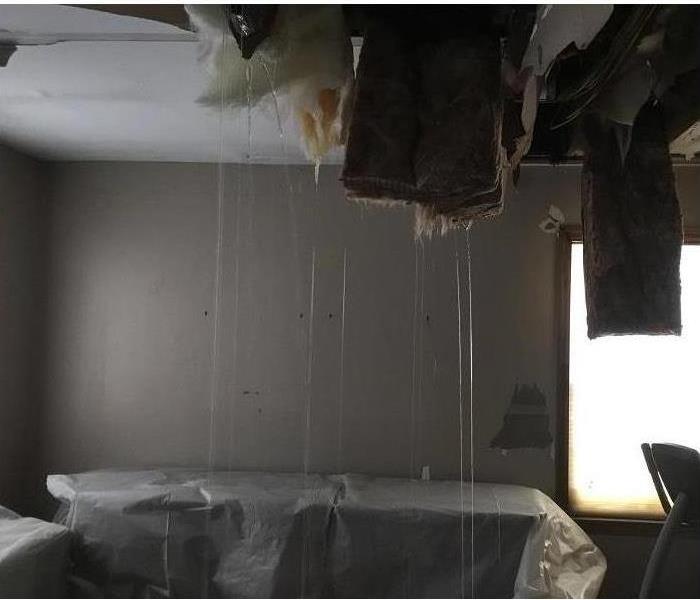Avoid Frozen Pipes in Your Fishkill Home!
12/17/2019 (Permalink)
Subzero temperatures can cause even interior pipes to freeze. Burst pipes are one of the most common causes of property damage during frigid weather and can cause thousands in water damage.
Unheated interior spaces such as basements, attics, and garages are the first to cause problems. But even pipes running through cabinets or exterior walls can freeze. There are some simple things you can do to keep your water running and your house dry.
“Pipe insulation can cost as little as 50 cents per linear foot at your local hardware store,” says Susan Millerick, IBHS spokeswoman.“ So, for not much more than the cost of the aspirin you’d need, you can avoid the headaches of cleanup, loss of precious keepsakes, and the cost of your insurance deductible.” Use the pipe insulation liberally to protect any vulnerable pipes.
How to Beat the Freeze
Once the temperature starts dropping outside, you should take precautions inside to keep your pipes warm and water running. Temperatures below 20F are the warning spot so keep the area above that to thwart issues.
Keep the thermostat set to the same temperature during day and night. Not the best time to lower the heat to adjust for expenses as a water damage repair can be thousands of dollars to repair.
Open kitchen and bathroom cabinet doors to let warmer air to circulate around the plumbing. (If you have small children, be sure to remove any harmful cleaners and household chemicals.)
Let the cold-water drip from a faucet served by exposed pipes (think basement utility sinks or laundry sinks). Running water through the pipe, even at a trickle, helps prevent pipes from freezing.
Keep garage doors closed, especially if there are water supply lines in the garage. Consider some insulation around the windows and doors to help. This could help your whole house as well.
If you plan to be away during cold weather, leave the heat on in your home, set to a temperature no lower than 55° F. The last thing you want is to come home to an igloo.
For the long term, add insulation to attics, basements, and crawl spaces. Insulation will maintain higher temperatures in those areas. And to prevent drafts, seal cracks and openings around windows, doors, and at sill plates, where the house rests on its foundation.
How to Thaw Frozen Pipes
If you turn on a faucet and only a trickle comes out, you may well have a frozen pipe. If you think the pipes are frozen, be careful when thawing them out because if the pipe has already burst, the water will come flowing out and flood your home. If a pipe has broken, turn off the water at the main shutoff valve, which is usually at the water meter or where the main line enters the house. If the water is still running and no pipes have burst, you can take the following steps. (we usually recommend you call a plumber to avoid a much bigger problem.)
Turn on the faucet- Running water through the pipe, as cold as it is, will help melt ice in the pipe.
Apply heat to the section of pipe- using an electric heating pad wrapped around the pipe, an electric hair dryer, or a portable space heater (kept away from flammable materials), or by wrapping pipes with towels soaked in hot water. Do not use a blowtorch, a kerosene or propane heater, a charcoal stove, or any device with an open flame; the high heat can damage the pipes or even start a fire.
Apply heat until full water pressure is restored. Check all other faucets in your home to see whether you have additional frozen pipes. If one pipe freezes, others may freeze, too.
Sometimes, things just happen no matter how much you might prep, just keep in mind that SERVPRO of Western Dutchess County is here 24/7 for when water damage happens. Call us at 845-831-3600 and we'll make it "Like it never even happened."





 24/7 Emergency Service
24/7 Emergency Service
